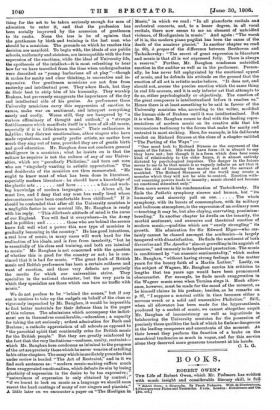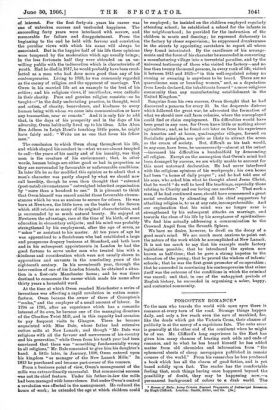BOOKS.
ROBERT OWEN.• MB Life of Robert Owen, which Mr. Podmore has written with much insight and considerable literary skill, is full
• Robert Owen: a Biography. By Frank Podmore. With 44 Diustrattons, 2 Photogravure Plates and Facsimiles. 2 vols. Loudon : Hutchinson and Coe 1.243. net.] of interest. For the first forty-six years his career was one of unbroken success and unclouded happiness. The
succeeding forty years were interlaced with sorrow, and memorable for failure and disappointment. From the beginning to the end he held with fervour and conviction the peculiar views with which his name will always be associated. But in the happier half of his life these opinions were tempered by the moderation which age usually brings ; in the less fortunate half they were obtruded on an un- willing public with the indiscretion which is characteristic of youth. Had he died in 1817, be would probably have been recol- lected as a man who had done more good than any of his contemporaries. Living to 1858, he was commonly regarded as the enemy of religion and the opponent of marriage. Yet Owen in his married life set an example to the best of his critics ; and his religious views, if unorthodox, were catholic in their charity. Pure and genuine religion consists—so he taught—" in the daily undeviating practice, in thought, word and action, of charity, benevolence, and kindness to every human being with whom we come into communication or have any transaction, near or remote." And it is only fair to add that, in the days of his prosperity and in the days of his adversity, Owen habitually lived up to his ideas. Like Abou Ben Adhem in Leigh Hunt's touching little poem, he might have fairly said: " Write me as one that loves his fellow men."
The conclusion to which Owen clung throughout his life, and which shaped his conduct in—what we are almost tempted to call—the years of his sanity and of his insanity, was that man is the creature of his environment ; that, in other words, human beings are either good or bad in proportion as they are surrounded by favourable or unfavourable conditions. In later life he so far modified this opinion as to admit that a man's character was partly shaped by what we should now call heredity, though he even then thought that " external (post-natal) circumstances " outweighed inherited organisation by " more than a hundred to one." It is pleasant to think that Owen himself was reared amidst those favourable circum- stances which be was so anxious to secure for others. He was born at Newtown, the little town on the banks of the Severn which still-retains so many of its original characteristics, and is surrounded by so much natural beauty. He enjoyed at Newtown the advantage, rare at the time of his birth, of some education in elementary subjects; and bis mind was probably strengthened by his employment, after the age of seven, as " usher " or assistant to his master. At ten years of age be was apprenticed to a Scotehman who had established a large and prosperous drapery business at Stamford, and both here and in his subsequent appointments in London he bad the good fortune to serve under men who treated him with a tirindness and consideration which were not usually shown to apprentices and servants in the concluding years of the eighteenth century. In his seventeenth year, through the intervention of one of his London friends, he obtained a situa- tion in a first-rate Manchester house ; and he was there destined to commence the career which made his name after thirty years a household word.
At the time at which Owen reached Manchester a series of inventions was effecting a rapid revolution in cotton manu- facture. Owen became the owner of three of Crompton's "mules," and the employer of a small amount of labour. In 1794 or 1795, after an experience which has a romantio interest of its own, he became one of the managing directors of the Chorlton Twist Mill, and in this capacity had occasion to pay frequent visits to Glasgow. There he became acquainted with Miss Dale, whose father had extensive cotton mills at New Lanark; and though "Mr. Dale was religious with all the fervour and narrowness of his country and his generation," while Owen from his tenth year had been convinced that there was " something fundamentally wrong in all religions," Mr. Dale consented to give him his daughter's band. A little later, in January, 1800, Owen entered upon his kingdom "as manager of the New Lanark Mills." In 1813 he purchased and became part-owner of the concern.
From a business point of view, Owen's management of the mills was extraordinarily successful. But commercial success was not its chief feature. Under his father-in-law the mills had been managed with benevolence. But under Owen's control a revolution was effected in the management. He reduced the hours of work ; he extended the age at which children could
be employed ; he insisted on the children employed regularly attending school ; he established a school for the infants in the neighbourhood ; he provided for the instruction of the children in music and dancing ; he repressed dishonesty in the factory by closer supervision; he suppressed drunkenness in the streets by appointing caretakers to report all whom they found intoxicated. By the excellence of his arrange- ments and the force of his character he succeeded in converting a manufacturing village into a terrestrial paradise, and by the universal testimony of those who visited the factory—and no less than twenty thousand persons, in every rank of life, visited it between 1815 and 1825—" in this well-regulated colony no cursing or swearing is anywhere to be beard. There are no quarrelsome men or brawling women," and, as a deputation from Leeds declared, the inhabitants formed " a more religious community than any manufacturing establishment in the United Kingdom."
Sanguine from his own success, Owen thought that he had discovered a panacea for every ill. In the desperate distress which followed the great war, he advocated the formation of what we should now call farm colonies, where the unemployed could find or claim employment. His difficulties would have been great in any case, for Owen knew little or nothing about agriculture ; and, as he found out later on from his experience in America and at home, quadrangular villages, formed on Socialistic principles, are quite as likely to attract the scrim as the cream of society. But, difficult as his task would, in any case, have been, he unnecessarily—almost at the outset —increased his difficulties a hundredfold by denouncing all religion. Except on the assumption that Owen's mind had been deranged by success, we are wholly unable to account for this most untoward declaration. He had never interfered with the religious opinions of his workpeople ; his own house bad been "a house of daily prayer "; and he bad told one of his sons, who asked him what he thought about Jesus Christ, that he would "do well to heed His teachings, especially those relating to Charity and our loving one another." That such a man, if he had continued sane, should have commenced a great social revolution by alienating all his chief supporters by attacking religion is, to us at any rate, incomprehensible. And our explanation that his mind was no longer sane is strengthened by his subsequent attacks on marriage, and towards the close of his life by his acceptance of spiritualism. We find him actually addressing a communication to the Crowned Angel from the Seventh Sphere.
We have no desire, however, to dwell on the decay of a good man's mind. We are much more anxious to point out the nature of the work which he accomplished at New Lanark. It is not too much to say that his example made factory legislation possible ; that he introduced the system now known as half-time ; that he gave a strong impetus to the education of the young ; that he proved the wisdom of infants' schools ; that be was the first great promoter of co-operation ; that he succeeded in convincing his contemporaries that crime itself was the outcome of the conditions in which the criminal was reared; and that, in one of the unhappiest periods of English history, he succeeded in organising a sober, happy, and contented community.



























































 Previous page
Previous page